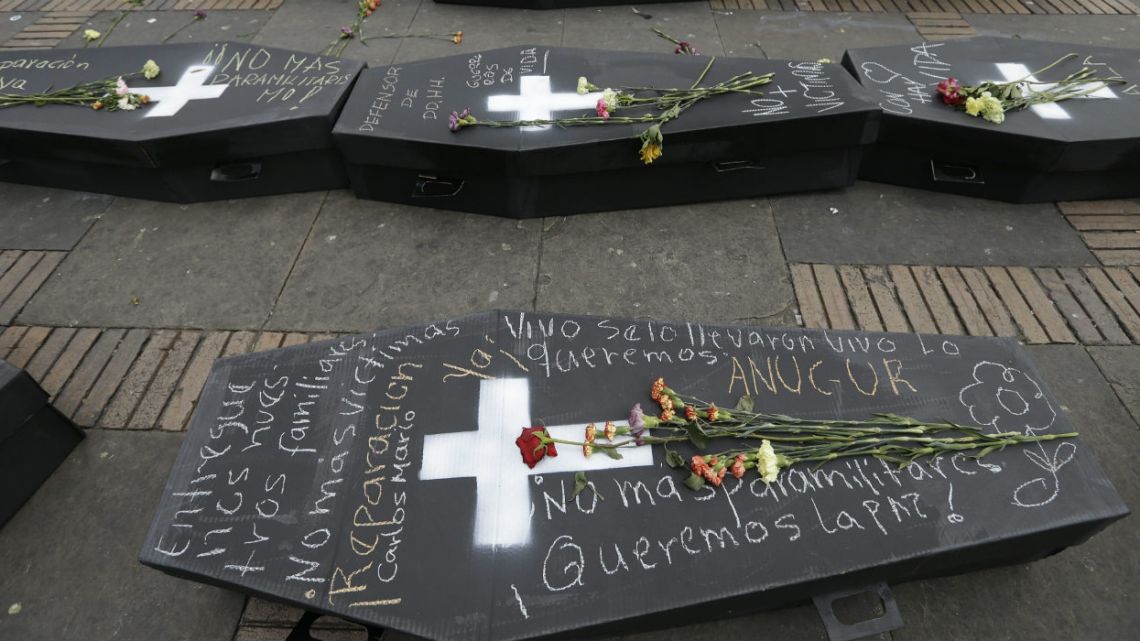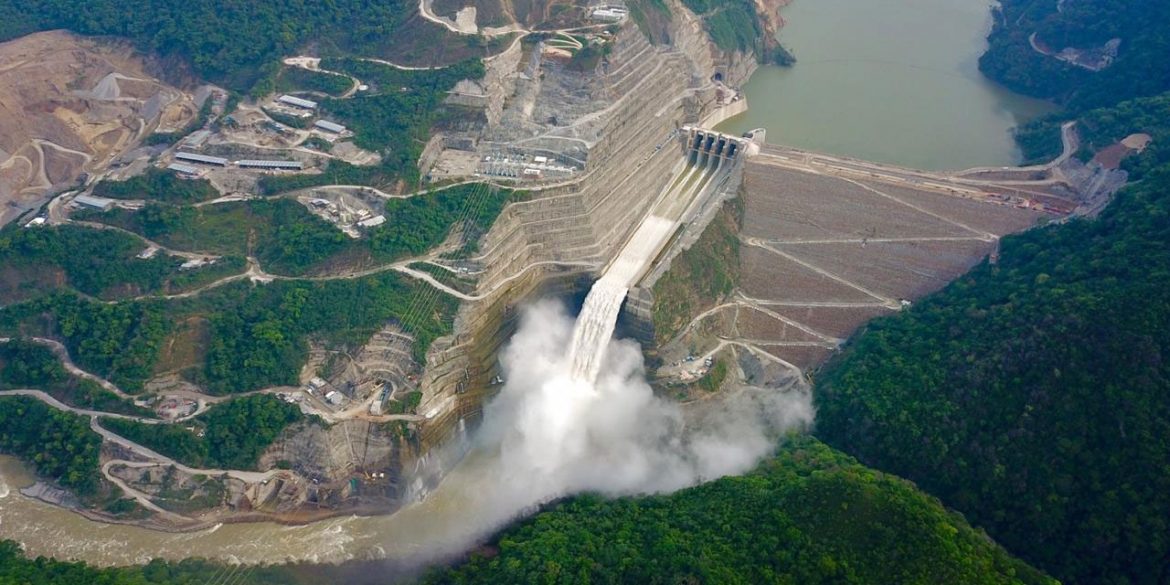Judi Lynn
Judi Lynn's JournalNGOs charge Brazil's Bolsonaro with risk of indigenous 'genocide' at UN
by Sue Branford on 5 March 2020
. . .

An isolated indigenous group in Acre state, Brazil. Image by Gleilson Miranda / Governo do Acre under the Creative Commons Attribution 2.0 Generic license.
“The Moxihatetea [uncontacted indigenous group] is vigilant and they want to keep away from the Whites. They don’t know who the gold panners (garimpeiros) are and they don’t want them to approach them. They flee deep into the forest to get away from them,” said Yanomami leader Davi Kopenawa during his address at the opening of the 43rd session of the United Nations Human Rights Council in Geneva on 2 March.
Wearing a traditional headdress and speaking in the Yanomami language, Kopenawa expressed deep concern for the future of the Moxihatetea, an isolated indigenous group living within Yanomami Park, an indigenous reserve located in the very north of Brazil, near the frontier with Venezuela, and covering 9,664,975 hectares (37,317 square miles).
“The gold panners began to steal their food — their cassava, their bananas, their sugar cane. … The Moxihatetea attacked them with bows and arrows, but the gold panners, more violent, reacted firing at them with their shotguns,” Kopenawa told an international audience.
“The Moxihatetea fled higher up the river, but there are gold panners there too, by the Catrimani River. The Indians are surrounded. I don’t know them personally. I’ve only seen their huts from the air. But I’m very worried. Soon they will be exterminated. There’s no doubt the gold panners will kill them with their shotguns and their illnesses, their malaria, their pneumonia. The Indians have no vaccines to protect them. They will all disappear.”
More:
https://news.mongabay.com/2020/03/ngos-charge-brazils-bolsonaro-with-indigenous-genocide-at-un/
Red Cross chief: 'Life without fear is overdue in Colombia'
LATIN AMERICA | TODAY 14:22
Despite peace deal between the government and FARC, violence and disappearances continues to plague Colombia.

FLOWERS LAY ON SYMBOLIC CASKETS THAT REPRESENT VICTIMS OF COLOMBIA'S CIVIL CONFLICT AT BOLIVAR SQUARE IN BOGOTA, COLOMBIA. | AP/FERNANDO VERGARA
The head of the International Committee of the Red Cross in Colombia warned Wednesday that ongoing human rights violations and the forced displacement of thousands from their homes because of violence mean many still live in fear.
The humanitarian organisation recorded 352 victims of explosive devices and anti-personnel mines as well as the displacement of more than 25,000 people last year, suggesting the armed conflict is deepening in vulnerable areas.
“Civilians are still suffering the worst consequences of armed conflict and violence,” Christoph Harnisch, head of the ICRC’s delegation in Colombia, said in presenting the findings. “Life without fear is overdue in Colombia.”
Colombia’s government signed an historic peace accord with leftist guerrillas from the Revolutionary Armed Forces of Colombia (FARC) in 2016, ending Latin America’s longest-running conflict, but the nation is still struggling to combat smaller rebel groups and drug trafficking organizations in several parts of the country.
More:
https://www.batimes.com.ar/news/latin-america/red-cross-life-without-fear-is-overdue-in-colombia.phtml
Colombia's 2018 election fraud: investigations against Uribe and Duque piling up
by Adriaan Alsema March 5, 2020
Piling evidence Colombia’s President Ivan Duque won the 2018 election through fraud triggered new criminal charges against his political patron, former President Alvaro Uribe.
Senior journalist Gonzalo Guillen filed election fraud charges against Uribe on Wednesday after publishing 2018 wiretap transcripts in which one of Uribe’s late mafia friends, Jose Guillermo Hernandez, said he was buying votes for Duque.
Hernandez, an associate of notorious crime lord Marquitos Figueroa, was murdered in what was called a botched robbery in Brazil in May last year.
Despite the evidence that got him in legal trouble again, Uribe dismissed Guillen’s revelations as a “fairy tale” and said Duque’s 2018 campaign was handled “rigorously” by campaign manager Luigi Echeverri.
More:
https://colombiareports.com/investigations-against-uribe-and-duque-pile-up-over-colombias-2018-election-fraud/
Colombia criminalizing instead of protecting human rights defenders: UN rapporteur
by Adriaan Alsema March 5, 2020
While failing to provide protection, Colombia’s authorities criminalize the defense of human rights, a United Nations special rapporteur said Wednesday.
The report of Michel Frost, the UN’s Special Rapporteur on the Situation of Human Rights Defenders, is the latest to fiercely criticize President Ivan Duque‘s administration.
The top UN human rights concluded that “the vast majority of human rights defenders in Colombia are unable to work in a safe and supportive environment. They lack positive social and public recognition and are undermined and criminalized because of their human rights work by State and non-State actors. They are in danger and the risks they face have increased in the three years since the signing of the Peace Agreement.”
At least 323 defenders have been killed since then, against a backdrop of high rates of impunity. Colombia remains the country with the highest number of murdered human rights defenders in Latin America, and threats against them have soared.
UN special rapporteur Michel Forst
More:
https://colombiareports.com/colombia-criminalizing-instead-of-protecting-human-rights-defenders-un-rapporteur/
Femicide in Colombia left at least 44 victims so far this year, and one girl impaled
by Adriaan Alsema March 4, 2020
Despite efforts to decrease hate crimes against women in Colombia, at least 36 woman and six girls were murdered so far, according to Bogota news website 070.
The student newspaper’s second monthly report on femicide in the country is nauseating as it exposes the sadistic cruelty involved in the registered cases of femicide.
One 14-year-old girl was stripped naked and impaled, one 16-year-old girl was beheaded by her boyfriend and the youngest victim was only four years old.
These three cases happened in February alone. The victims registered by 070 in the first two months of the year were between four and 71 years old.
More:
https://colombiareports.com/femicide-in-colombia-left-at-least-44-victims-so-far-this-year-and-one-girl-impaled/
How paramilitaries laid the foundation for Colombia's largest hydroelectric dam

(Image: EPM)
by Mariana Calvo March 2, 2020
Colombia’s largest hydroelectric dam, HidroItuango, has made international headlines — and for all the wrong reasons.
From its inception, the $4.5 billion-dollar dam built near Ituango, Antioquia, on the Cauca River by Medellin public utilities company EPM, was built with high expectations and even greater ambitions.
Set to supply 17% of Colombia’s energy needs, powerful politicians and businessmen branded Hidroituango as a direct solution to the country’s long struggle with high energy costs and prevalent energy shortages.
Beyond energy, Hidroituango was promoted by elites and members of the Colombian establishment, most notably former President Alvaro Uribe as a symbol of a new era of peace and prosperity in a country that has never known it.
More:
https://colombiareports.com/how-paramilitaries-laid-the-foundation-for-colombias-largest-hydroelectric-dam/
'Astounding new finds' suggest ancient empire may be hiding in plain sight

Teotihuacan was once a bustling, cosmopolitan metropolis, the center of an empire whose reach may have extended 1000 kilometers away to the Maya region. MAX SHEN/GETTY IMAGES
By Lizzie WadeFeb. 27, 2020 , 1:30 PM
SAN JUAN TEOTIHUACAN, MEXICO—On 16 January 378 C.E., a stranger arrived in Tikal, a large Maya city in what is now northern Guatemala. His name was Sihyaj K’ahk’ (SEE-yah Kak), or Fire is Born, and he was likely a mighty warrior from a distant land. Many archaeologists think he hailed from Teotihuacan, a metropolis of 100,000 people about 1000 kilometers northwest of Tikal, near today’s Mexico City. And he may have come with an army.
The stone Maya monuments that record Sihyaj K’ahk’s arrival don’t say why he came or how he was received by Chak Tok Ich’aak, or Jaguar Paw, the long-reigning king of Tikal. But the day Sihyaj K’ahk’ marched into the city was the day Jaguar Paw died.
The engravings suggest Sihyaj K’ahk’ had been sent by a powerful foreign ruler called Spearthrower Owl. Within 2 years, Spearthrower Owl’s young son was crowned the new king of Tikal. In portraits carved on stone monuments there, the new king, named Yax Nuun Ayiin, holds an atlatl, a spearthrower used by Teotihuacan warriors, and wears a Teotihuacan-style headdress adorned with tassels. Some images of him and his father on monuments at Tikal are even carved in the flat, geometric style of Teotihuacan art, distinct from the intricate, naturalistic portraits of the Maya. Under the exotic new king and his descendants, Tikal became one of the most powerful cities in the Maya region.
Archaeologists have known the outline of those events for decades, but have long debated their meaning. Now, new evidence from both Teotihuacan and the Maya region has brought the relationship between those two great cultures back into the spotlight—and hints it may have been more contentious than most researchers had thought.
More:
https://www.sciencemag.org/news/2020/02/astounding-new-finds-suggest-ancient-empire-may-be-hiding-plain-sight
Bolsonaro's Plan to Legalize Crimes Against Indigenous Peoples
March 1, 2020 5:00AM EST
Languages
Available In English Português
Published in UOL Notícias
Maria Laura Canineu
Brazil Director, Americas Division
@mlcanineu
Andrea Carvalho
Consultant
@deiarauscher
When President Jair Bolsonaro presented a draft bill to Congress, on February 5, to regulate mining, hydroelectric power projects, and other commercial enterprises in Indigenous territories, he recognized that it would “face pressure from environmentalists.” And so it should.
The Amazon, the world’s largest rainforest, is one of most important carbon sinks, critical for mitigating climate change. Data from Brazil's National Space Research Agency (INPE) show that deforestation there increased by 29.5 percent from August 2018 to July 2019. Recent studies warn that the accelerated destruction is driving the Amazon toward an irreversible “tipping point” at which it will become a dry savannah and release billions of tons of stored carbon into the atmosphere. Bolsonaro’s bill could fuel this dangerous trend.
By legalizing the commercial exploitation of natural resources in Indigenous territories, the bill would invite even more encroachment on and deforestation of Indigenous land. In addition to direct environmental impacts, mining and large-scale infrastructure projects like hydroelectric dams require roads, which drive deforestation because they grant easier access to the rainforest for rogue loggers and cattle ranchers.
What the world has been watching in the Amazon is not only an environmental crisis, but also a public security emergency. In a report published last year, Human Rights Watch documented how Indigenous people who have organized themselves to defend their forests—in the absence of adequate law enforcement—have been threatened, attacked, and, according to community leaders, murdered by people engaged in illegal deforestation.
More:
https://www.hrw.org/news/2020/03/01/bolsonaros-plan-legalize-crimes-against-indigenous-peoples#
Claim That Paved Way For Right-Wing Coup In Bolivia
Claim That Paved Way For Right-Wing Coup In Bolivia
Monday, 2 March 2020, 3:11 pm
Article: Common Dreams
A new study released by a pair of MIT researchers Thursday reveals that, contrary to claims from the U.S.-backed Organization of American States, there was no fraud in Bolivia's October 20, 2019 elections—an accusation used by the OAS and others as a pretext for supporting the coup in the country that deposed President Evo Morales and replaced him with an unelected right-wing government.
"Good lord," tweeted MSNBC journalist Chris Hayes. "Given the fact the entire Morales government was toppled over accusations of election fraud, the OAS has a lot to answer for."
The Intercept's Jon Schwarz took a similar approach to the findings and the OAS' conclusions.
https://twitter.com/schwarz/status/1233074566576136192
MIT researchers John Curiel and Jack R. Williams reviewed the OAS report on the election for the Washington Post and found that the "election irregularities" cited by the group were based on "problematic" statistical claims. The OAS report rested its claim on the assumption that these so-called irregularities gave Morales a boost in numbers that raised his results over 10% higher than any other candidate, precluding a runoff election.
More:
https://www.scoop.co.nz/stories/WO2003/S00006/new-mit-study-disputes-key-claim-that-paved-way-for-right-wing-coup-in-bolivia.htm
Profile Information
Member since: 2002Number of posts: 160,515